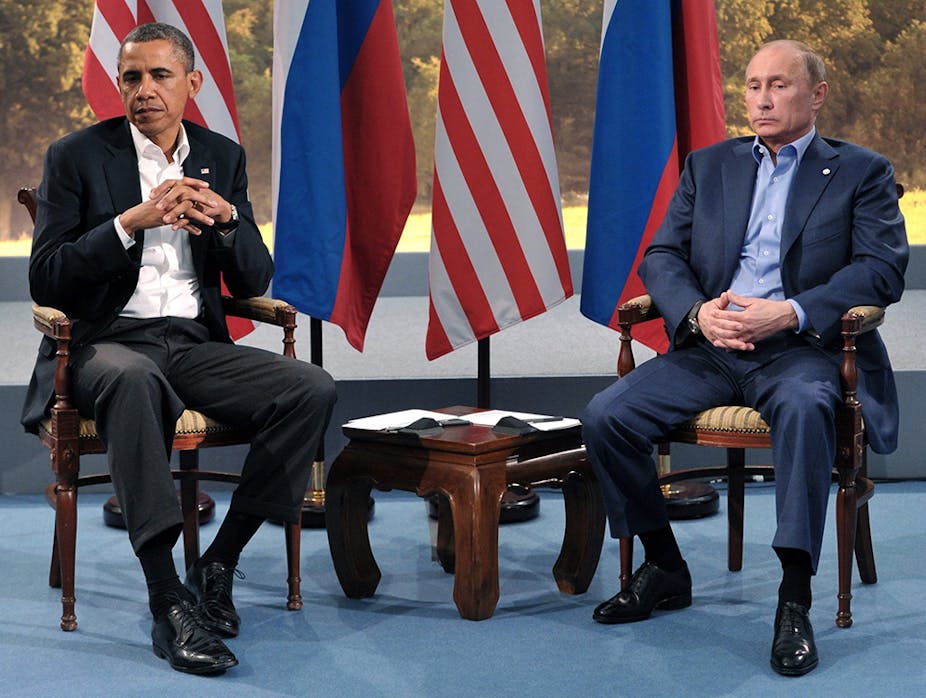Barack Obama has so far held firm against a growing chorus demanding that the US should boycott the 2014 Winter Olympics in Sochi after Russia’s introduction of discriminatory laws banning gay “propaganda” caused an outcry around the world.
Despite considerable pressure from the Lesbian-Gay-Bisexual-Transgender (LGBT) communities in the USA and UK for boycotts of Russian products and the Winter Olympics, both Obama and David Cameron have expressed their distaste for the laws but ruled out a boycott of the Games. Obama told a news conference that it would be unfair on the athletes who have trained so hard.
That there is a distinct coolness between Obama and Russian president Vladimir Putin, however, is not in dispute. The US president’s decision to cancel his summit with Putin next month has been widely interpreted as a snub following the Russian decision to grant NSA leaker Edward Snowden asylum for a year which put Obama under intense pressure to send a clear message of disapproval to the Kremlin.
Anti-Russian feeling has been running high on Capitol Hill for some time now, most clearly symbolised by the Sergei Magnitsky Rule of Law Accountability Act, passed by the US Senate in December last year. Obama, therefore, had little choice but to send the message he did. But what will this mean for US-Russian relations now?
The White House explained its decision by saying it would be of little use holding the meeting considering how little progress these two had made in their joint agendas. While the timing suggests this is something of a disingenuous statement, the Snowden matter should indeed be seen as the tipping point rather than the sole cause. There are far more important failures in this bilateral relationship.
Is the ‘reset’ over?
The Syrian crisis, particularly, has shown just how effective Russia can be as a “spoiler” and, as more neighbouring states get drawn into that conflict, we have perhaps only begun to see the results of the failure to resolve this crisis.
That is not to say that the US and Russia cannot work together to good effect. A notable recent success has been in Afghanistan. The USA is also aware that Russia has some leverage, and therefore a role to play as a broker, with Iran and North Korea. On the other hand, on these latter two, Russia’s interests coincide with the USA’s only to a point and ultimately their interactions over these are marked more by rivalry than partnership.
Whether relating to matters of international relations or democracy and human rights at home, Russia and the USA too often look divided. That said, it is important not to read too much into the current situation. US-Russian relations have waxed and waned for many years now and both sides are practised in the art of keeping the relationship ticking over. This is not the first time the “reset” has been said to be over, after all.
What makes recent developments most significant now is the timing. Until his return to office as president, Putin looked fairly invulnerable. No matter the level of electoral fraud and corruption that has been suggested by his enemies, even his worst critics did not deny Putin’s popularity at home. But as his popularity levels have dropped, so his attacks on hard-fought freedoms have increased.
There are the continued assaults on mainstream media and journalists, which are accompanied now by new scrutiny of NGOs, an anti-gay law, show trials, crackdowns on social media providers.
Time for US to act
The time is ripe for the USA to make a choice. It can treat this snub to Putin as the first salvo in a more concerted campaign to force Russia to make changes at home. This will mean a complete end to the reset until such time as real transformation in Russian political life can be seen. Or it can continue with the reset, casting this latest development as a mere blip in an otherwise improving relationship.
In the current context, the ground in Russia is looking fertile for the first kind of strategy to be considered legitimate and effective. Politically, Putin has looked vulnerable for about a year and Russian watchers are speculating about whether and when his key supporters will withdraw their support. Commercial interests in Russia, notwithstanding the example of Mikhail Khodorkovsky, are becoming more prominent; they were vital to Russia finally joining the WTO and many have recently openly come out in support of Alexei Navalny in Russia has seen unheralded numbers joining street demonstrations.
As for the second, White House press secretary Jay Carney’s recent briefing shows this is still considered a viable option. The US will be alive to the fact that the Kremlin could well have done without the dilemma presented by Snowden. Seen from a technocratic perspective, this looks to be a small but tricky question of diplomacy. Temporary asylum signals a hedging strategy, which the White House is unlikely to have missed, no matter what is said publicly.
Either way, the USA needs to ensure that sufficient attention is paid to Russia, something it has not done well so far. What needs to be remembered is not what caused and defined the Cold War, but what brought about its end. Too often, the USA remembers only its role. It forgets that the collapse of the USSR was as much, if not more, about its domestic political situation. Right now, Russia looks ready for change. Those pressuring the system from within need those on the outside to put pressure where they can. The USA is a vital player in this regard and this is a good time for it to come out in favour of the reformists.

